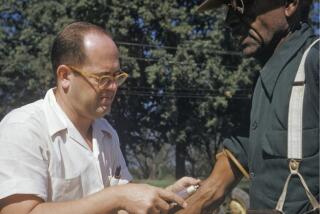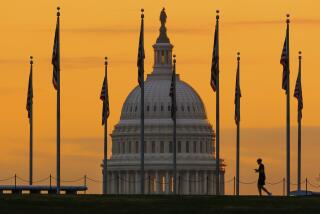Survey Examines Housing, Jobs, Law : Blacks, Whites Disagree Over Basic Racial Issues
- Share via
WASHINGTON — In a vivid illustration of the gulf still dividing American society, a new national survey released Wednesday found dramatic disagreement between blacks and whites about the severity of racial problems in such basic areas as education, housing, job opportunities and the law.
For example, two-thirds of the whites surveyed believe that black people “get equal pay for equal work,” while two-thirds of blacks believe just the opposite.
Similarly, half of the black people surveyed said that local police “keep blacks down,” while an equal percentage of white people said that police are more helpful than harmful to blacks, according to the study, which was conducted by Louis Harris for the NAACP Legal Defense and Educational Fund.
“These gaps in perception underscore the need for continuing educational efforts to help white Americans appreciate that race continues to be a factor in influencing our daily lives,” the study’s authors said.
Different Experiences
James O. Gibson, who directs the Rockefeller Foundation’s national programs on equal opportunity, said that the gap stems from the differences in experiences among blacks and whites. “If people aren’t touched by (racial bias) then they have no informed basis for an attitude,” he said. “It’s the out-of-sight, out-of-mind factor.”
On housing, 55% of whites said that blacks are not worse off than other groups with comparable education and income, but 64% of blacks believe they are worse off.
At the same time, the study found significant areas of agreement. About 8 of 10 respondents of both races, for instance, agreed that more money should be spent attacking the causes of crime--such as poverty and lack of motivation--than on sentencing criminals to long jail terms.
Nine of every 10 blacks and whites also believe in the need for special school programs to motivate poor youngsters to stay in school. And 9 of every 10 members of both races support efforts to locate more jobs in areas where poor people live, the study found.
“While there are some differences among whites and blacks, there is compelling evidence that the public is ready to get on with the business of attending to many of the race-relations issues that have not been addressed during the past eight years,” Julius Chambers, director-counsel of the NAACP Legal Defense and Educational Fund, said at a news conference.
‘Affirmative Neglect’
His comment reflects the view, held by many black people, that the election of George Bush offers minorities and poor people an opportunity to reverse some of the social policies initiated by President Reagan, who practiced what one fund official called “affirmative neglect.”
Despite the fiscal handcuffs about to be passed on from Reagan to Bush because of the huge federal deficit, Chambers asserted that “some new programs will be necessary” to improve conditions for the impoverished. The programs “will cost something,” he said, “but it’s a worthwhile investment.”
As a measure of the depth of negative feelings black people hold against Reagan and an example of the perceptual gap between blacks and whites generally, the survey found that half of the whites questioned believe his Administration has been helpful to blacks while almost 80% of blacks in the survey consider the Administration oppressive.
Despite some areas of agreement between the races, whites continue to stereotype blacks, the study found, noting that more than a third of whites think that “blacks tend to have less ambition than whites” and a fifth believe that “blacks breed crime.” The study said that 17% of whites believe that “blacks have less native intelligence than whites.”
While these figures represent a decline in stereotyping since 1963, “that level of bias indicates that the anti-black virus among whites is still abundant and not hard to find,” the study said. It found similar views among Asians and Latinos, noting, for instance, that one-third of Asian-Americans and one-fourth of Latinos who identified themselves as white feel that “blacks breed crime.”
The survey, called “The Unfinished Agenda on Race in America,” was conducted from June to September and included 3,123 interviews with people of all races.
The fund also released a separate survey of blacks who are persistently poor, finding that many do not receive federal benefits.
Little Special Training
That survey of 347 people in eight cities, including Los Angeles, New York, Philadelphia, Atlanta and Chicago, found that only 11% said they receive federal or state housing subsidies to help pay rent and that only 15% have ever received special job training.
A huge majority of these poor people, called part of the “underclass,” said they want more education, the survey said, adding that “finding productive work” was the most important objective cited in the survey.
This survey “decisively refutes the notion that the people in the underclass have no desire to lift themselves out of poverty,” the study said. However, the study called the lack of child-care facilities “the major stumbling block” faced by poor women seeking work, with 86% of the single mothers surveyed getting no child care help from their family or the government.
More to Read
Sign up for Essential California
The most important California stories and recommendations in your inbox every morning.
You may occasionally receive promotional content from the Los Angeles Times.












